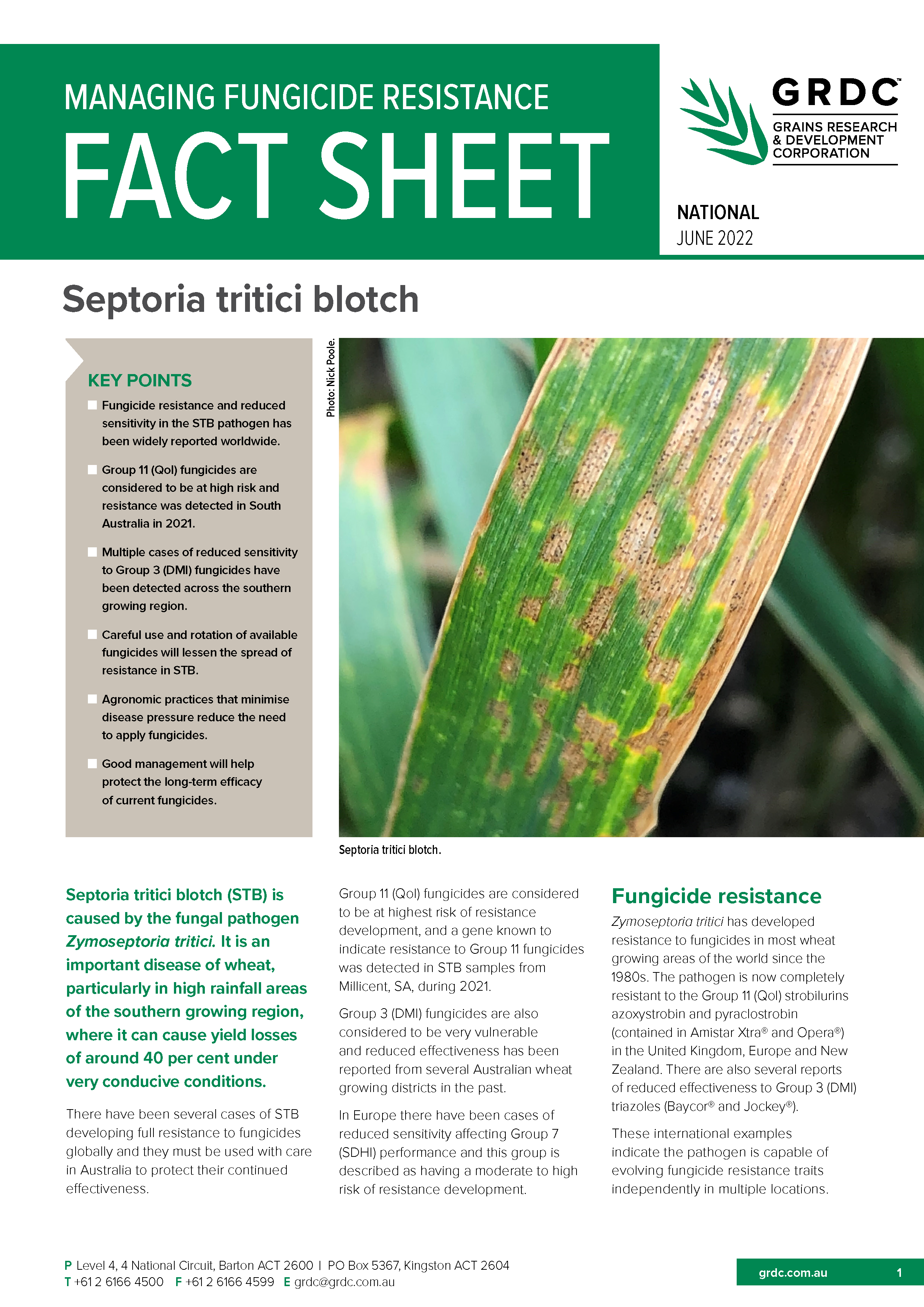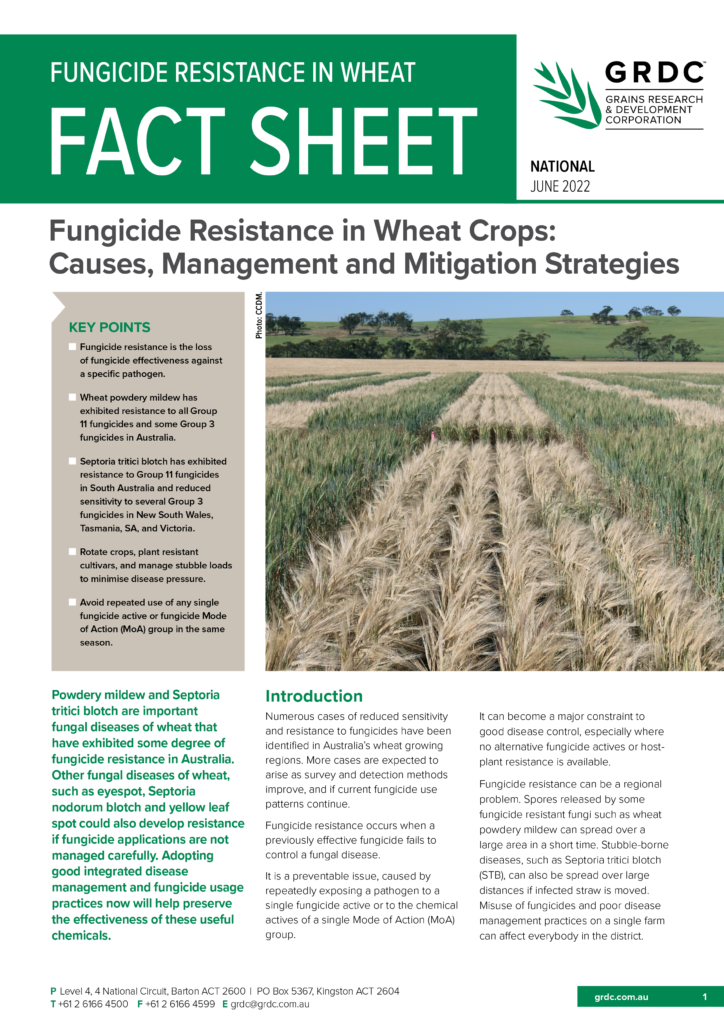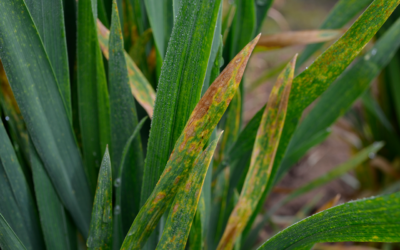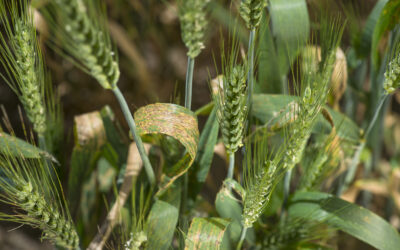WHEAT
Septoria Tritici Blotch (STB)
Zymoseptoria tritici
Manage
disease pressure
Minimise
fungicide use
Engage
with extension
Septoria tritici blotch (STB)
Zymoseptoria tritici
Septoria tritici blotch (STB) is an important disease of wheat, particularly in high rainfall areas of the southern region.
It is more common in early sown crops and in wet springs, and is typically favoured by stubble retention, susceptible cultivars, cool, wet weather (15–20°C, relative humidity > 70%), dense crop canopies and extended periods of leaf wetness or dew.
It can cause up to 20% yield loss annually, and much more (> 50%) in conducive years. It survives on stubble.
Resistance status
Reduced sensitivity – Group 3 fungicides cyproconazole, epoxiconazole, flutriafol, propiconazole, tebuconazole and triadimenol in NSW, SA, Tas. and Vic.
FACT SHEETS
Septoria tritici blotch
Septoria tritici blotch is caused by the fungal pathogen Zymoseptoria tritici. It is an important disease, particularly in high rainfall areas of the southern growing region, where it can cause yield losses of around 40% under conducive conditions. There have been several cases of STB developing full resistance to fungicides globally and they must be used with care in Australia to protect continued effectiveness.
Fungicide resistance in wheat
Numerous cases of reduced sensitivity and resistance to fungicides have been identified in Australia’s wheat growing regions. More cases are expected to arise as survey and detection methods improve, and if current fungicide use patterns continue. Fungicide resistance is a preventable issue, caused by repeatedly exposing a pathogen to a single fungicide active or to the chemical actives of a single Mode of Action (MoA) group.
Fungicides in Australia
Fungicides are a valuable tool in crop protection worldwide. However, most are vulnerable to the pathogens they target developing fungicide resistance, so responsible management is essential for preserving ongoing efficacy. There is a limited number of fungicide Mode of Action groups registered for use on crops in Australia.
Fungicide resistance
Fungicide resistance is a serious issue that can affect crop yields in the short term, while impacting on the long term viability of registered fungicides. Understanding how fungicide resistance develops, how it places additional pressure on other fungicides, and how fungicide use should be managed to minimise risk is vital for protecting future crop yields.
CASE STUDY
AFREN case study – septoria tritici blotch
Tasmanian wheat growers enjoy a cool climate, relatively high rainfall and long growing season.
However, those cool, moist growing conditions lead to considerable disease pressure from Septoria tritici blotch (STB).
WEBINARS
Septoria tritici blotch
Tuesday 12 March 2024
An update on monitoring for septoria tritici resistance to fungicides with Brad Baxter, research officer – plant pathology, NSW DPI, and Nick Poole, Managing Director, FAR Australia. STB is a persistent issue for wheat growers in the high and medium rainfall zones of the northern and southern grain growing regions..
Southern region webinar
Monday 16 August 2021
Australian Fungicide Resistance Extension Network (AFREN) Fungicide Resistance in Southern Region webinar with Dr Tara Garrard (SARDI), Nick Poole (FAR Australia) and Steve Marcroft (Marcroft Grains Pathology).
SA webinar
Thursday 2 July 2020
Australian Fungicide Resistance Extension Network (AFREN) Fungicide Resistance in SA webinar led by Dr Tara Garrard and Dr Hugh Wallwork, plant pathologists with SARDI.
High Rainfall Zone webinar
Tuesday 4 August 2020
Australian Fungicide Resistance Extension Network (AFREN) Fungicide Resistance in the High Rainfall Zone webinar led by Nick Poole from FAR Australia.
Victoria webinar
Wednesday 26 August 2020
Australian Fungicide Resistance Extension Network (AFREN) Fungicide Resistance in Victoria webinar by Grant Hollaway, Agriculture Victoria.
NSW/Qld webinar
Friday 24 July 2020
Australian Fungicide Resistance Extension Network (AFREN) Fungicide Resistance in NSW/Qld webinar by Steven Simpfendorfer, NSW DPI, Lisle Snyman, DAFQ and Levente Kiss, Centre for Crop Health, USQ.
PODCASTS
The why and how of rotating fungicides to minimise the risk of resistance
In this AFREN 2 podcast, Associate Professor Fran Lopez, CCDM, Curtin University, talks about the importance of rotating fungicides to minimise the risk of fungicide resistance developing in your paddocks. He outlines strategies for growers to implement on farm.
Fungicide risk factors
While farmers typically spray fungicide to manage one disease, Dr Steven Simpfendorfer explains how spraying one pathogen can inadvertently encourage resistance in other pathogens that may be present. Some typical examples include rusts and powdery mildew in wheat; blackleg and sclerotinia in canola; and net blotches and powdery mildew in barley.
Applying fungicide for economic return
Nick Poole from FAR Australia provides an excellent explanation of how to target fungicide applications for the best economic return. He describes the value of focusing on critical growth stages and their ‘money leaves’, the best way to manage disease risk in crops before tillering, and the importance of protecting fungicide effectiveness for the long term.
Fungicide Resistance Five podcast series
The ‘Fungicide Resistance Five’ is the basis for an integrated disease management strategy that growers can use on-farm to reduce fungicide resistance pressure on crop pathogens.
This six-part podcast series, produced through the Australian Fungicide Resistance Extension Network (AFREN), unpacks the individual elements of the strategy to inform growers why and how they should minimise the risk of fungicide resistance developing in their paddocks.
AFREN is a significant GRDC investment that brings together a national network of regional plant pathologists, fungicide resistance experts and communications and extension specialists. It is co-ordinated through the Centre for Crop Disease Management (CCDM), a co-investment between the GRDC and Curtin University.
General fungicide resistance management
Dr Kylie Ireland, first Extension Coordinator of Australian Fungicide Resistance Extension Network (AFREN), discusses how fungicide resistance occurs, its potential impact on crop production, and how the Fungicide Resistance Five can help growers mitigate their risk.
Avoiding susceptible crop varieties
How does variety selection help slow fungicide resistance? Dr Grant Hollaway points out how planting crop varieties with genetic resistance to frequently occurring diseases can reduce disease pressure and an unhealthy reliance on fungicides.
The value of crop rotation
Long-practiced crop rotations are an effective non-chemical means of reducing (or even eliminating) soil and stubble borne fungal pathogens in paddocks. DPIRD plant pathologist Geoff Thomas discusses the continued importance of practicing crop rotation for disease control.
Non chemical strategies to reduce disease pressure
South Australian plant pathologist Dr Tara Garrard covers the range of agronomic practices growers have at their disposal to reduce disease pressure, limit fungicide applications and lower the risk of promoting fungicide resistance in their crops.
Strategic fungicide applications
Fungicides remain a valuable and powerful tool for managing crop disease and FAR Australia Managing Director Nick Poole explains how to identify the right times to apply fungicide for maximum effect and economic benefit.
Fungicide / Mode of Action rotation and mixtures
Using fungicide mixtures and rotating Mode of Action groups is vital to eliminate resistant pathogen strains. Fungicide resistance specialist Dr Fran Lopez-Ruiz from Centre for Crop Disease Management at Curtin University highlights the importance of a dynamic spray program.
VIDEOS
AFREN Fungicide Resistance Five
Animation
The Fungicide Resistance Five is an integrated disease management strategy to reduce disease pressure and minimise reliance on fungicides for disease control.
AFREN Fungicide Resistance Pyramid
Animation
Fungicides are at risk of developing resistance but there are cultural and non-chemical options to consider before applying. The AFREN is a useful management tool.
NEWS ARTICLES
Optimising seed-saving strategies starts at harvest
Wheat growers are being urged to monitor the effectiveness of fungicides this season after the common wheat disease, Septoria tritici blotch (STB), was discovered to be resistant to Group 11 fungicides (strobilurins).
Strobilurin resistance in Septoria tritici blotch confirmed in SA
Wheat growers are being urged to monitor the effectiveness of fungicides this season after the common wheat disease, Septoria tritici blotch (STB), was discovered to be resistant to Group 11 fungicides (strobilurins).







